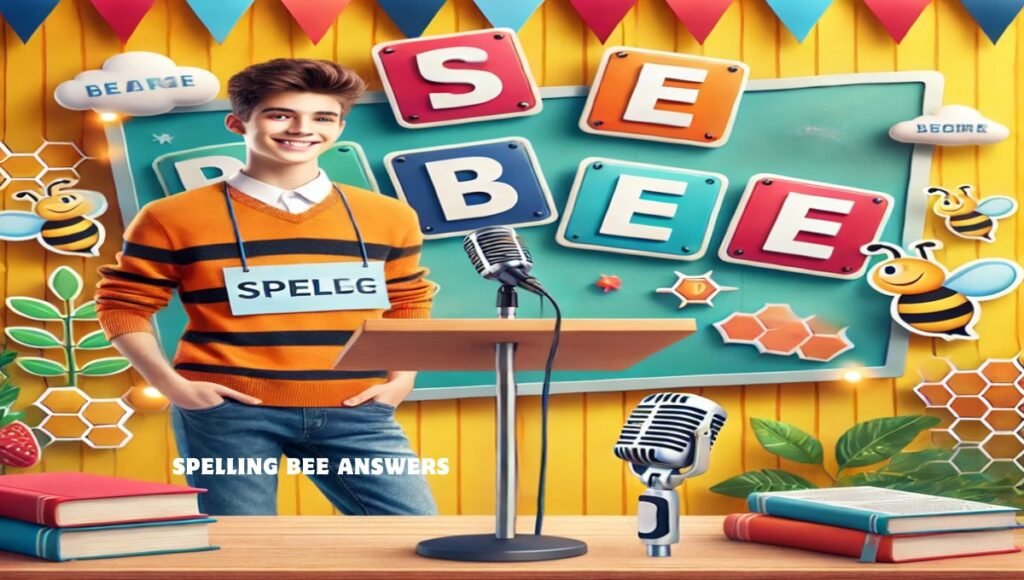Spelling bees are more than a test of memory; they’re a captivating way to expand your vocabulary and sharpen your language skills. Finding the right “spelling bee answers” daily can serve as a fantastic exercise in language enhancement, equipping you with new words, better spelling techniques, and an appreciation for language structure. This blog post will guide you on how exploring daily spelling bee answers can be a valuable resource for expanding your vocabulary and improving linguistic prowess.
Table of Contents
Why Are Spelling Bees So Popular?
Spelling bees date back over a century, initially appearing as a simple competition in school settings. However, as the decades passed, spelling bees became mainstream events with national and international competitions like the Scripps National Spelling Bee. The primary reason for their popularity lies in the benefits they bring:
- Vocabulary Enrichment: Regular exposure to spelling challenges introduces you to a plethora of new words. Understanding the spelling of complex words naturally extends to understanding their meanings and applications.
- Improved Memory and Concentration: Memorizing spellings requires focus, discipline, and sharp memory skills. Recalling spelling bee answers daily strengthens cognitive functions and develops concentration.
- Enhancing Language Skills: Apart from vocabulary, spelling bees also help improve pronunciation and understanding of language roots. Encountering words with diverse origins, such as Latin, Greek, or French, builds a strong language foundation.
How Spelling Bee Answers Help in Vocabulary Building
Engaging with daily spelling bee answers serves as a subtle but powerful means of improving your vocabulary. Here’s how:
- Encountering Uncommon Words: Spelling bees often contain words that are rarely used in daily conversation. By reviewing these answers, you encounter words that expand your verbal repertoire and allow you to impress others with your knowledge.
- Learning Context and Meaning: Beyond spelling, each word you encounter in a spelling bee has a unique story and usage. Understanding the context behind these words boosts your vocabulary as you begin to see how words fit naturally within sentences.
- Building Word Families: Many spelling bee words are built from roots, prefixes, and suffixes. For example, if the word “phonetic” appears, understanding the root “phon” can lead to grasping the meanings of other related words like “telephone,” “symphony,” or “megaphone.”
Strategies to Use Daily Spelling Bee Answers for Vocabulary Growth
Here are some practical steps to use spelling bee answers effectively to enhance your vocabulary skills:
- Create a Word Journal: Start a dedicated notebook or digital document to record new words you learn. Write down the word, its definition, pronunciation, and an example sentence.
- Practice With Friends or Family: Learning in a group can increase motivation. Challenge your friends or family to guess meanings or spellings, making vocabulary building a fun activity.
- Break Down Words: Many words in spelling bees consist of recognizable roots and affixes. Breaking down words into these components helps in understanding the structure, making it easier to remember their meanings and spellings.
- Use Technology: Mobile apps and online platforms offer daily spelling challenges and vocabulary exercises. Participating in these daily exercises can provide consistent practice and learning.
- Apply Words in Daily Conversation: Whenever possible, try to incorporate new words into your daily conversations. This helps reinforce the words in your memory, making them a permanent part of your vocabulary.
Daily Vocabulary Improvement Techniques
- Consistent Practice: Reviewing daily spelling bee answers regularly ensures you’re constantly exposed to new words.
- Synonym Exploration: For each new word, find synonyms to build a broader understanding of similar words.
- Read Widely: Whether it’s fiction, news, or articles, reading introduces you to different words in various contexts, reinforcing your spelling bee vocabulary.
Common Spelling Bee Words and Their Meanings
Here are some frequently encountered spelling bee words to get you started:
- Quandary: A state of confusion or uncertainty.
- Obfuscate: To make something unclear or difficult to understand.
- Benevolent: Kind-hearted, showing goodwill.
- Juxtapose: To place side by side for comparison or contrast.
- Labyrinthine: Complex and confusing like a maze.
Using daily spelling bee answers as a vocabulary tool exposes you to words like these, which can make your language skills more refined and versatile.
How to Find Spelling Bee Answers
Several online resources and websites provide daily spelling bee answers and vocabulary quizzes. These resources are invaluable for students, professionals, and language enthusiasts alike:
- Official Spelling Bee Websites: Many spelling bee organizations publish past competition words and study materials.
- Language Learning Apps: Apps like Quizlet or Vocabulary.com offer word lists similar to those used in spelling bees.
- Educational Blogs and Websites: There are blogs dedicated to language and vocabulary improvement that provide daily spelling bee word lists and answers.
FAQs
Q: How often should I practice with spelling bee answers?
A: Practicing daily is ideal for steady improvement, but even a few times a week can make a significant difference.
Q: Can spelling bee words be used in everyday conversation?
A: Yes, many spelling bee words are usable in daily conversations and can enrich your vocabulary.
Q: Are spelling bee answers suitable for all age groups?
A: Absolutely! Words range in complexity, so people of all ages can benefit, adapting the difficulty to their level.
By incorporating daily spelling bee answers into your learning routine, you’ll discover the pleasure of words and grow your vocabulary effortlessly. Make spelling bees your go-to resource for a word-rich life!

